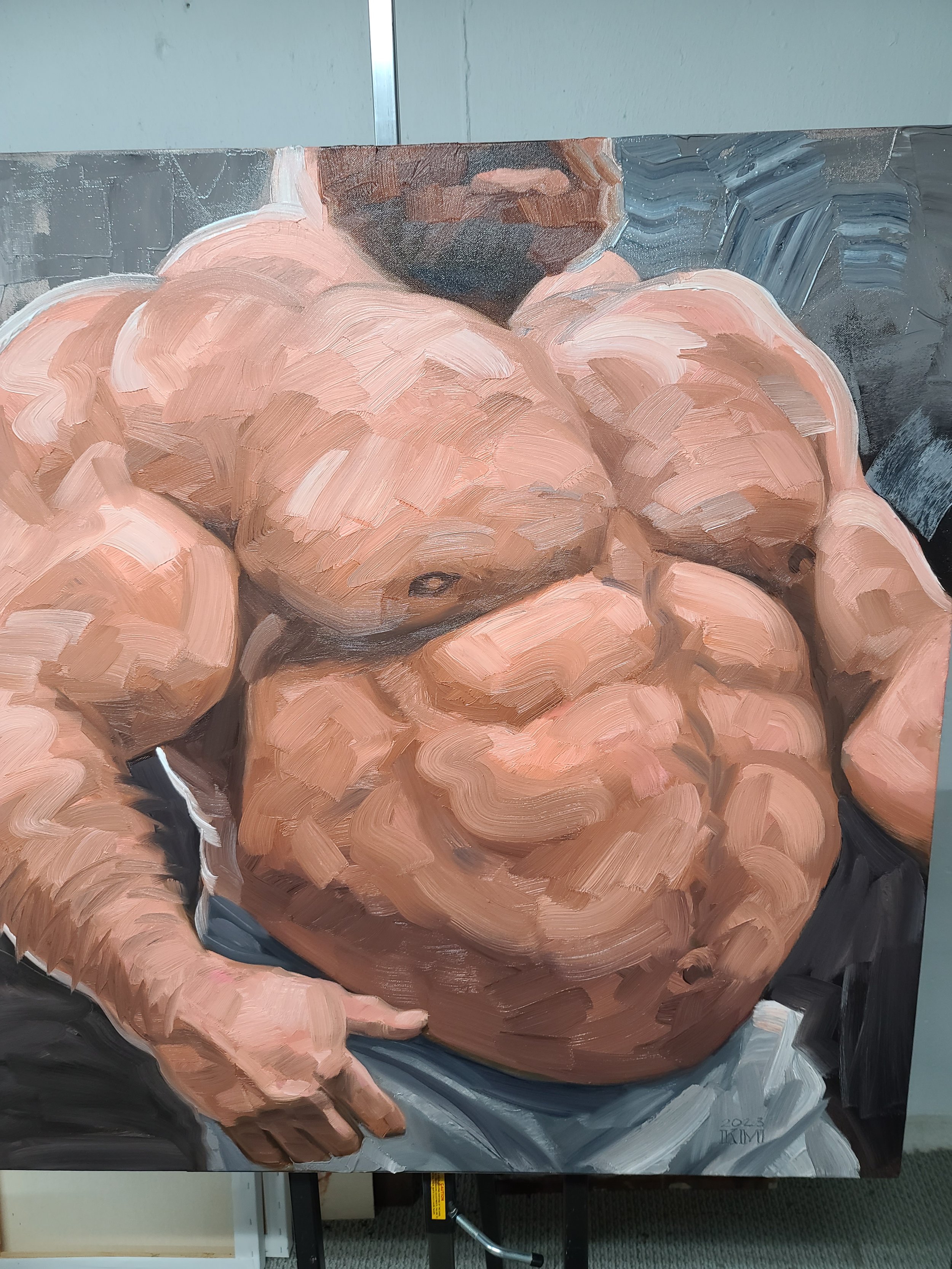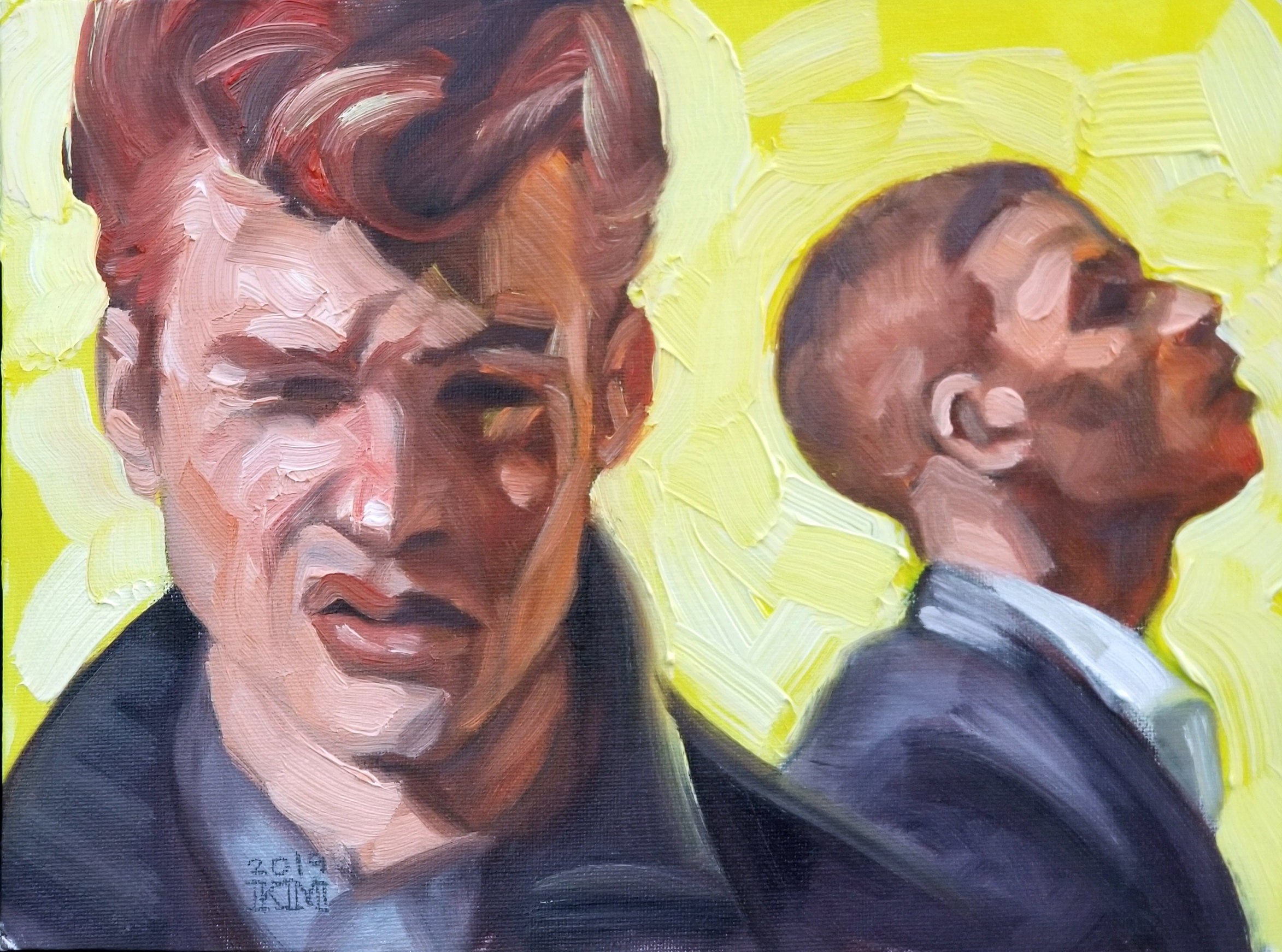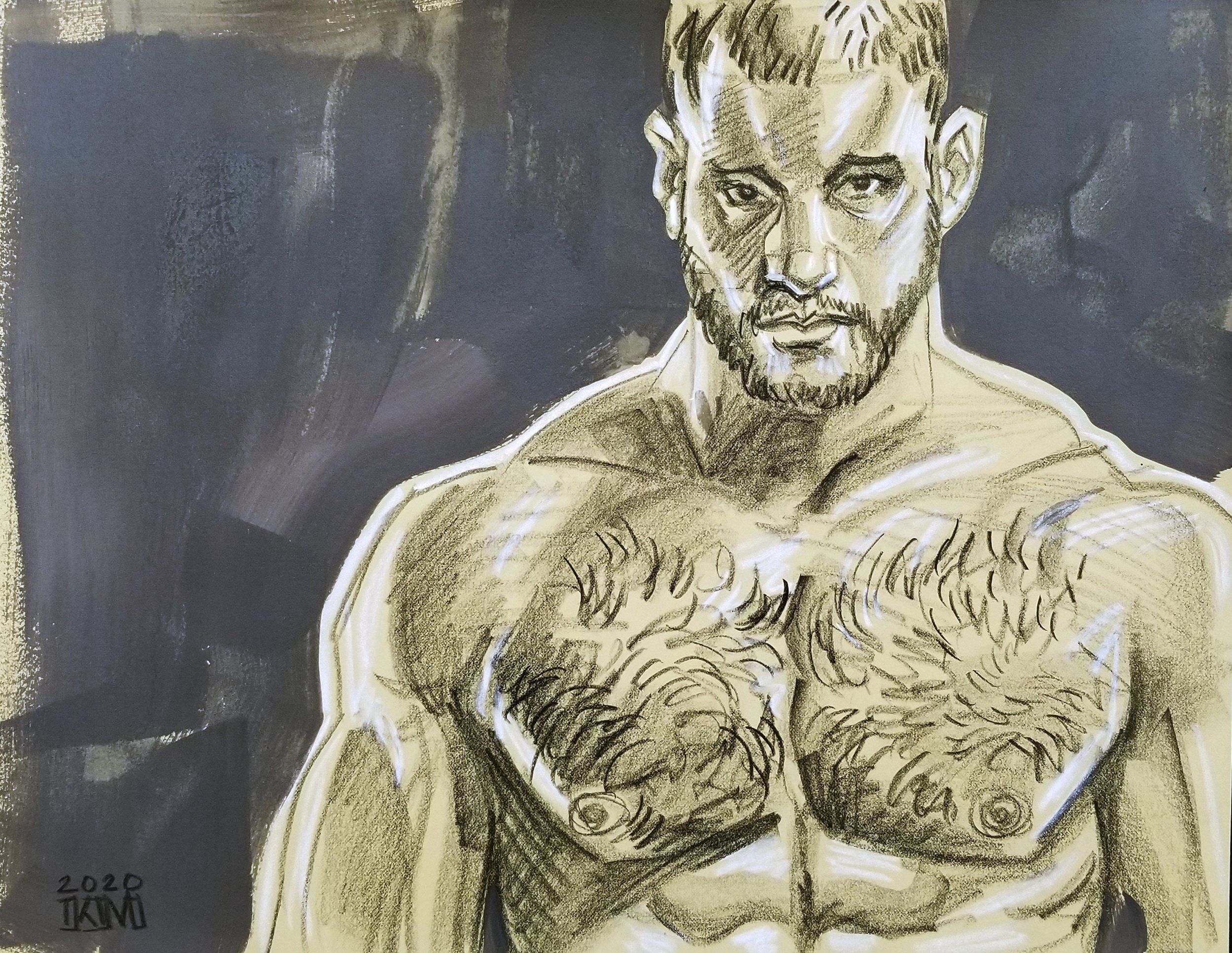 Image 1 of 14
Image 1 of 14

 Image 2 of 14
Image 2 of 14

 Image 3 of 14
Image 3 of 14

 Image 4 of 14
Image 4 of 14

 Image 5 of 14
Image 5 of 14

 Image 6 of 14
Image 6 of 14

 Image 7 of 14
Image 7 of 14

 Image 8 of 14
Image 8 of 14

 Image 9 of 14
Image 9 of 14

 Image 10 of 14
Image 10 of 14

 Image 11 of 14
Image 11 of 14

 Image 12 of 14
Image 12 of 14

 Image 13 of 14
Image 13 of 14

 Image 14 of 14
Image 14 of 14















Big Love, 36x36x1.5 inches oil on stretched canvas by Kenney Mencher
FREE SHIPPING Shipping takes 3-4 Weeks This ships from Round Lake Beach, Illinois. A suburb outside of Chicago. I use UPS and sometimes US Post.
This is on gallery wrapped canvas so there won’t be a need to frame it.
For years I had trouble accepting my body as I aged. So I began to paint and draw people who looked more like me and I realized I wasn’t alone when I discovered other bears and the concepts behind “body positivity.”
This painting is based in the tenets of the “body positivity” movement. Body positivity refers to the assertion that all people deserve to have a positive body image, regardless of how society and popular culture view ideal shape, size, and appearance.
Some of the goals of the body positivity movement include:
Challenging how society views the body
Promoting the acceptance of all bodies
Helping people build confidence and acceptance of their own bodies
Addressing unrealistic body standards
In gay culture, a bear is a larger and often hairier man who projects an image of rugged masculinity.
Many straight folks are unaware of the bear subculture. Hardly a surprise, since a powerful majority rarely concerns itself with the doings of a marginalized minority. When, three or four years ago, I first mentioned bears to my straight colleagues in the English Department at Virginia Tech, none of them knew what I was talking about, though by now at least one of them calls me “The Bear.” Similarly, my heterosexual students, as expert as they might be on current media, seem equally ignorant about this topic.
Most GLBT folks, however, by now seem to know the basics. A “bear” is a hairy, bearded, brawny-to-bulky gay man, usually displaying aspects of traditional masculinity. A cub is a younger version of the same; a wolf is a lean, hairy man; an otter a young version of that. “Woof!” is a lustful expression, meaning essentially: “Tasty! I’d like to climb all over that!” “Grrrrr!” means much the same. As you can see, after twenty-some years of development, the bear community, like any subculture, has its own jargon, sometimes called “bearspeak” or “vocabulary.” It also has its own values, its own style, and its own commodities. There are bear-oriented bars, festivals, music, movies, magazines, and books. There are regional clubs for bears not only in metropolitan centers, where the communities first developed, but also in rural areas.
The paint on this is super thick and it took several days to make the painting. Recently I moved from California, where I had a pretty cramped small studio, to a larger house where I’ve taken the entire basement as my painting studio. This is allowed me to experiment and try out new things that I have never been able to do because I have a lot more space and places for things to dry and services to work on. I can work on paintings over several days or weeks rather than have to rush through them and work on only one painting at a time.
This is one of a group of paintings that were worked on over the course of a week or two in a more layered approach. It began more as a rough sketch on the canvas panel that I worked out a little bit more with crayon and worked out the shading and environment using my imagination. Over the next couple of days the painting was developed more.
The next couple of days were spent working on an underpainting that began his thin washes of oil paint and ended up with thicker more opaque layers.
The finishing day that I worked on this painting I attempted to build up the surface is more and enhance the textures so that the paint textures matched a little bit more closely the physicality or textures of the figures and the environment they are in. Some of the paint is almost 2 to 3 cm thick and applied with plastering knives and thick bristle brushes which I think gives the surface and almost skin like quality.
FREE SHIPPING Shipping takes 3-4 Weeks This ships from Round Lake Beach, Illinois. A suburb outside of Chicago. I use UPS and sometimes US Post.
This is on gallery wrapped canvas so there won’t be a need to frame it.
For years I had trouble accepting my body as I aged. So I began to paint and draw people who looked more like me and I realized I wasn’t alone when I discovered other bears and the concepts behind “body positivity.”
This painting is based in the tenets of the “body positivity” movement. Body positivity refers to the assertion that all people deserve to have a positive body image, regardless of how society and popular culture view ideal shape, size, and appearance.
Some of the goals of the body positivity movement include:
Challenging how society views the body
Promoting the acceptance of all bodies
Helping people build confidence and acceptance of their own bodies
Addressing unrealistic body standards
In gay culture, a bear is a larger and often hairier man who projects an image of rugged masculinity.
Many straight folks are unaware of the bear subculture. Hardly a surprise, since a powerful majority rarely concerns itself with the doings of a marginalized minority. When, three or four years ago, I first mentioned bears to my straight colleagues in the English Department at Virginia Tech, none of them knew what I was talking about, though by now at least one of them calls me “The Bear.” Similarly, my heterosexual students, as expert as they might be on current media, seem equally ignorant about this topic.
Most GLBT folks, however, by now seem to know the basics. A “bear” is a hairy, bearded, brawny-to-bulky gay man, usually displaying aspects of traditional masculinity. A cub is a younger version of the same; a wolf is a lean, hairy man; an otter a young version of that. “Woof!” is a lustful expression, meaning essentially: “Tasty! I’d like to climb all over that!” “Grrrrr!” means much the same. As you can see, after twenty-some years of development, the bear community, like any subculture, has its own jargon, sometimes called “bearspeak” or “vocabulary.” It also has its own values, its own style, and its own commodities. There are bear-oriented bars, festivals, music, movies, magazines, and books. There are regional clubs for bears not only in metropolitan centers, where the communities first developed, but also in rural areas.
The paint on this is super thick and it took several days to make the painting. Recently I moved from California, where I had a pretty cramped small studio, to a larger house where I’ve taken the entire basement as my painting studio. This is allowed me to experiment and try out new things that I have never been able to do because I have a lot more space and places for things to dry and services to work on. I can work on paintings over several days or weeks rather than have to rush through them and work on only one painting at a time.
This is one of a group of paintings that were worked on over the course of a week or two in a more layered approach. It began more as a rough sketch on the canvas panel that I worked out a little bit more with crayon and worked out the shading and environment using my imagination. Over the next couple of days the painting was developed more.
The next couple of days were spent working on an underpainting that began his thin washes of oil paint and ended up with thicker more opaque layers.
The finishing day that I worked on this painting I attempted to build up the surface is more and enhance the textures so that the paint textures matched a little bit more closely the physicality or textures of the figures and the environment they are in. Some of the paint is almost 2 to 3 cm thick and applied with plastering knives and thick bristle brushes which I think gives the surface and almost skin like quality.
FREE SHIPPING Shipping takes 3-4 Weeks This ships from Round Lake Beach, Illinois. A suburb outside of Chicago. I use UPS and sometimes US Post.
This is on gallery wrapped canvas so there won’t be a need to frame it.
For years I had trouble accepting my body as I aged. So I began to paint and draw people who looked more like me and I realized I wasn’t alone when I discovered other bears and the concepts behind “body positivity.”
This painting is based in the tenets of the “body positivity” movement. Body positivity refers to the assertion that all people deserve to have a positive body image, regardless of how society and popular culture view ideal shape, size, and appearance.
Some of the goals of the body positivity movement include:
Challenging how society views the body
Promoting the acceptance of all bodies
Helping people build confidence and acceptance of their own bodies
Addressing unrealistic body standards
In gay culture, a bear is a larger and often hairier man who projects an image of rugged masculinity.
Many straight folks are unaware of the bear subculture. Hardly a surprise, since a powerful majority rarely concerns itself with the doings of a marginalized minority. When, three or four years ago, I first mentioned bears to my straight colleagues in the English Department at Virginia Tech, none of them knew what I was talking about, though by now at least one of them calls me “The Bear.” Similarly, my heterosexual students, as expert as they might be on current media, seem equally ignorant about this topic.
Most GLBT folks, however, by now seem to know the basics. A “bear” is a hairy, bearded, brawny-to-bulky gay man, usually displaying aspects of traditional masculinity. A cub is a younger version of the same; a wolf is a lean, hairy man; an otter a young version of that. “Woof!” is a lustful expression, meaning essentially: “Tasty! I’d like to climb all over that!” “Grrrrr!” means much the same. As you can see, after twenty-some years of development, the bear community, like any subculture, has its own jargon, sometimes called “bearspeak” or “vocabulary.” It also has its own values, its own style, and its own commodities. There are bear-oriented bars, festivals, music, movies, magazines, and books. There are regional clubs for bears not only in metropolitan centers, where the communities first developed, but also in rural areas.
The paint on this is super thick and it took several days to make the painting. Recently I moved from California, where I had a pretty cramped small studio, to a larger house where I’ve taken the entire basement as my painting studio. This is allowed me to experiment and try out new things that I have never been able to do because I have a lot more space and places for things to dry and services to work on. I can work on paintings over several days or weeks rather than have to rush through them and work on only one painting at a time.
This is one of a group of paintings that were worked on over the course of a week or two in a more layered approach. It began more as a rough sketch on the canvas panel that I worked out a little bit more with crayon and worked out the shading and environment using my imagination. Over the next couple of days the painting was developed more.
The next couple of days were spent working on an underpainting that began his thin washes of oil paint and ended up with thicker more opaque layers.
The finishing day that I worked on this painting I attempted to build up the surface is more and enhance the textures so that the paint textures matched a little bit more closely the physicality or textures of the figures and the environment they are in. Some of the paint is almost 2 to 3 cm thick and applied with plastering knives and thick bristle brushes which I think gives the surface and almost skin like quality.












